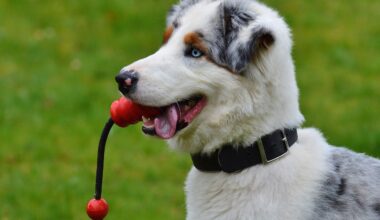Case Studies: Successful Socialization Stories of Special Needs Dogs
Socializing dogs with special needs requires specific approaches to ensure their comfort and safety. Case studies illustrate how tailored strategies can lead to success. For example, a dog named Max, who was diagnosed with autism, thrived through gradual introductions to other dogs in a controlled environment. Initially, short interactions with calm canines helped Max gain confidence. Over time, he learned to engage more freely. The use of positive reinforcement, such as treats and praise, encouraged his social behaviors. Owners reported significant improvements in his willingness to engage. Additionally, establishing routine visits to dog parks during quieter hours minimized stress for Max. Gradually increasing the exposure allowed him to adapt without feeling overwhelmed. These techniques not only improved his social skills but also enhanced his overall well-being. Engaging with other dogs in a positive manner led to a more balanced temperament. This case exemplifies how targeted efforts in dog socialization can yield remarkable results, showcasing that with understanding, special needs dogs can thrive in social settings like their peers. Advocacy for more inclusive socialization practices continues to grow, promoting enhanced quality of life for these dogs.
Another inspiring case involves Daisy, a visually impaired rescue dog. Daisy initially exhibited signs of fear and anxiety around unfamiliar environments and other dogs. Her owner implemented a fundamental strategy of utilizing sound cues to guide her during socialization sessions. By employing coins in a jar, they created a unique sound, associating it with treats. This innovative approach empowered Daisy to navigate her surroundings safely. Regular play dates with a gentle guide dog helped Daisy become more at ease with social interactions. The gentle, confident demeanor of her companion also encouraged playfulness rather than fear. Over a few months, Daisy transformed; she went from a scared and isolated dog to one who actively participated in dog-friendly gatherings. The inclusion of tactile games and interactive toys further stimulated her senses and enhanced her experience. Daisy’s journey exemplified the importance of building confidence in dogs with disabilities. Through dedicated training and patience from her owner, Daisy now enjoys a fulfilling life with her peer group. Success stories like Daisy’s showcase the potential for growth and development in special needs dogs when given the proper tools and environment for socialization.
Then there’s Buddy, a dog with mobility challenges due to hip dysplasia. Initially, Buddy exhibited frustration and aggression towards other dogs, stemming from his limitations. His owner sought training techniques that focused on building Buddy’s confidence while respecting his physical constraints. Utilizing harnesses to support Buddy during walks allowed him to feel secure, while slowly integrating socialization with dogs that had similar energy levels. This thoughtful pairing created a much more comfortable experience for Buddy. Furthermore, group training sessions focusing on low-impact activities played a crucial role. By engaging Buddy in exercises like nose work and gentle play, his frustrations dissipated, fostering bonding experiences. The social settings centered around understanding each dog’s abilities led to enriching interactions. Buddy learned to communicate better with others, decreasing his aggression. His transformation highlighted that successful socialization can occur at their own pace, respecting each canine’s unique needs. Owners of special needs dogs might replicate this approach; the emphasis being on customized methods tailored to each dog’s physical capabilities. Buddy’s case ultimately underscores the value of patience and targeted interventions in the social development of dogs facing challenges.
Learning from Successes
A remarkable case involves Luna, a dog with anxiety rooted in past trauma. Luna’s journey to socialization involved a loving, patient owner who understood the importance of a slow, steady approach. Early interactions were conducted away from bustling parks, opting instead for quiet environments. Gradually, she was introduced to one calm dog at a time, ensuring positive experiences. Each positive encounter was reinforced with calming words and treats. Over time, Luna became more confident, learning to approach new dogs with curiosity rather than fear. Regular training classes that emphasized building emotional security also contributed significantly to her success. The owner and trainer introduced safe spaces where Luna could retreat if she felt overwhelmed. This combined approach cleared the path for Luna to develop friendships with other dogs, blossoming into her true character. Her story inspires many owners struggling with similar challenges in socializing their dogs. Approaches highlighting the need for understanding and pace adaptation showcase the significance of trauma-informed socialization techniques. Gathering from Luna’s experience, advocates stress patience and emotional support as foundational elements in the socialization of anxious special needs dogs.
Another commendable case is that of Rocky, a dog that struggled with severe aggression towards strangers due to a lack of early socialization. His owners first addressed this challenge by collaborating with a professional trainer specializing in behavioral issues. An assessment highlighted the need for controlled exposure to new people. The owners arranged for consistent interactions, specifically with friends who knew how to approach Rocky calmly. Initial sessions involved the trainer using techniques such as counter-conditioning, which paired the sight of strangers with treats and praise. Gradually, Rocky learned that new faces were not a threat—this transformed his view. Sessions were short and structured, building trust over time. With repeated positive experiences, Rocky showcased a significant reduction in aggression levels. His case illustrates the effectiveness of collaboration between pet owners and trainers in resolving behavioral challenges. Implementing these strategies led to Rocky’s improved responses, making outings enjoyable for everyone involved. Additionally, Rocky’s progress emphasizes the necessity for owners to seek out appropriate resources when facing tough behavioral issues. This proactive approach can yield fruitful outcomes and improved dog-owner relationships, reflecting the true essence of socializing special needs dogs successfully.
Lastly, we can mention Bella, who had a hearing impairment. Initially, Bella’s inability to hear led to miscommunications with other dogs and owners. Her owner, aware of Bella’s situation, educated herself on non-verbal communication and cues. Using hand signals to train Bella became the ultimate key to her successful socialization. The owner organized sessions in varied, familiar environments to enhance Bella’s comfort and provide opportunities for social interaction. Additionally, pairing Bella with dogs trained to work with special needs pets accelerated her learning curve. The learning experiences focused on playtime, using visual cues, and introducing new social dynamics gradually. Bella thrived in this environment. She exhibited an understanding of her surroundings and increasing confidence, allowing her to navigate social situations like a pro. Bella’s transformation inspires many pet owners facing similar circumstances. By prioritizing clear communication methods, special needs dogs can enjoy engaging interactions. The combination of visual training strategies and supportive peer friendships created a solid foundation for Bella’s success story. These successful cases reinforce the belief that with love, support, and proper techniques, socialization for special needs dogs is indeed achievable.
Conclusion: The Importance of Patience and Love
Through these case studies, it’s evident that every special needs dog has the potential to thrive socially given the right environment and tailored strategies. Owners’ dedication and understanding directly impact successful outcomes, whether it’s employing unique training techniques, fostering supportive relationships with other pets, or utilizing patience during challenging phases. Each story presented underscores the need for customized approaches that cater to individual dogs’ needs. The importance of positive reinforcement, emotional support, and gradual exposure cannot be understated. As society becomes more aware of the special needs of these dogs, resources and community support grow, paving the way for countless successful socialization journeys. It remains crucial for dog owners to remain informed and adaptable when working with canines facing challenges, ensuring their emotional well-being and happiness. By employing these successful strategies, special needs dogs can experience fulfilling social interactions just like their peers. With continued advocacy, awareness, and proactive measures, many dogs can lead enriched lives full of friendships. Their stories serve as a reminder: love, understanding, and proper guidance create lasting change in the lives of special needs dogs, making socialization a rewarding journey.
Success stories of special needs dog socialization convey profound lessons about patience and understanding. These experiences offer valuable insights for pet owners navigating similar paths. It emphasizes the responsibility we carry in fostering a society that recognizes the potential within every dog, regardless of challenges. The toolkit gathered from diverse scenarios can empower owners to embrace the unique journey of their furry friends. Sharing these impactful narratives helps build a supportive community that uplifts special needs dogs and their families. With collaborative efforts, we can reshape perceptions, informing better practices. Moreover, spreading awareness surrounding the importance of special needs socialization ensures that dogs like Bella, Rocky, and Luna achieve fulfilling lives. Future initiatives focused on improved resources for training will be instrumental in advancing socialization efforts. Advocates are urged to celebrate and elevate these narratives, as they contribute significantly to understanding dog behavior. They showcase the diversity found within the dog community, reminding us all that each journey matters. Dogs deserve a chance to playfully engage in social experiences, fostering connections that enhance their joy and quality of life. As such narratives proliferate, they inspire hope and instigate action toward ensuring no pup is left behind.


